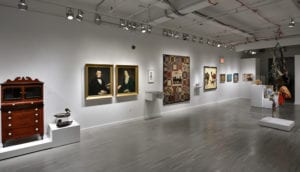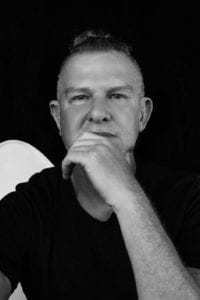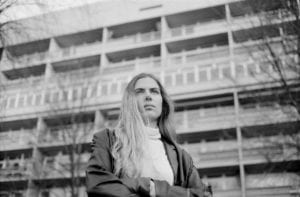Many of our AZ readers are city dwellers, so we’ve all most likely been in situations where we freak out – when it’s difficult to control the way we see, talk, and breathe – where vision becomes blurry, and the world spins. This chaos could happen randomly, triggered by seemingly mundane occurrences like sound, wind, large crowds, even solitude. Brooklyn-based artist Megan Suttles knows this struggle is all too real. In fact, her art is mostly based on anxiety and control, exploring the eternal conflict between restraint and disorder – the way we tend to conceal our inner confusion with the outward appearance of refinement and perfection.
Suttles’ work has become focused on revealing the chaos, making the invisible struggle visible. She works with everyday materials like aluminum tubing, packing tape, and bobby pins, and through gestural installations on both paper and in space, she reveals her understanding of the difference between uncertainty and certainty. Building on this concept even further, Suttles’ recent work consists of gestural chaotic forms but contained within a structure or some type of geometric shape.
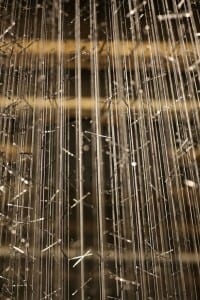
The Art Zealous Team witnessed Suttles’ intricate installation at the HOTEL CHELSEA LOVES ART! event this past winter and we fell in love with her interpretation of chaos. Suttles’ work has also been exhibited in such places as The UnScene in New York, The Shore Institute of Contemporary Arts in Asbury Park New Jersey, The Governor’s Island Art Fair, Pratt Institute in Brooklyn, The OK Hotel in Seattle, Hotel Chelsea in New York City, and Portal Art Fair in New York.
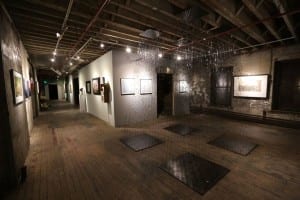
Art Zealous spoke with Suttles about exploring the eternal struggle between restraint and disorder and how her work interprets and reveals her idea of chaos.
Art Zealous: Hometown?
Megan Suttles: I grew up on the beach in North Carolina with my mother, an artist, and architectural designer. I spent much of my upbringing out on job sites with her watching her drawings being turned into large three-dimensional objects. It was always such a fascinating process to see the before and after.
AZ: Coffee or tea?
MS: Definitely coffee.
AZ: Current Internet obsession?
MS: Usually I’m searching the web for a good deal for an upcoming piece since I’m a collector. The last few weeks I’ve spent hours searching for thousands of chopsticks to use for a piece I just debuted for Portal, an art fair at Federal Hall.
AZ: How do you transform everyday materials to create your installations?
MS: After a curator offers me a space, I visit the site and decide how to create a spatial drawing to transform the given space. I then start to experiment with different objects to make the drawing. I started out as a two-dimensional artist, so I was formally trained to think about observation, line quality and slight variations of color. I think a lot about all of these things in my installations.
My process usually starts at a hardware store. When I was working on my thesis show in graduate school, I was interested in tangling things and finding a way to contain the tangle. I was interested in steam bending wood and thought for my thesis exhibition I would fill a room with a steam bent tangle of oak. I went to the hardware store to look at different kinds of wood for this project, where I saw a pile of stainless steel hose clamps. That evening I hooked the 55 hose clamps together in my studio and before I knew it, I had gathered 10,000 more.
Since graduate school, I have worked with miles of mono-filament, hundreds of shelving L-brackets, many rolls of packing tape, bounteous amounts of bobby pins, numerous feet of barbed wire, many aluminum tubes, thousands of chopsticks, and many other things.
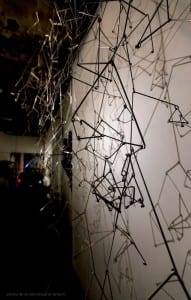
AZ: What’s been your favorite project?
MS: That’s such a hard question! I’ve been lucky in the way that my work is site specific, and I have been given some pretty exciting challenges. I’ve shown at the Governors Island Art Fair four times now, where I have gotten the opportunity to transform bedrooms and multiple attic spaces in the old coastguard barracks, and even an underground room in a magazine. I’ve also shown during NYC’s art fair week in the UnFair and the UnScene where the entire building’s interior was being transformed for the art fair.
If I were forced to pick one piece as my all time favorite, though, I would pick Concealed, a piece I made for the Shore Institute of Contemporary Arts in Asbury Park, NJ back in 2012. It was made out of mono-filament and packing tape, materials that were originally designed to not be seen. People interacted with this piece the way I always hoped where they became almost childlike by sitting and even laying on the floor underneath of it.
AZ: Where do you draw inspiration from?
MS: Living in a hectic city, travel, human interaction. The main focus of my work comes from the idea of controlled chaos or chaotic order. Most of my work is one object being repeated over and over in a very chaotic fashion, yet contained within a perfect grid or structure.
AZ: You’re Founder, Owner, Artist, and Curator of Hot Wood Arts. Please tell us about that initiative.
MS: Hot Wood Arts started as a popup show collaboration with a musician. Together we curated a night of music, performance art, and visual art. Through the center, I curate gallery shows and performances, hosts resident artists’ open studios, plans all events, write all press releases, and install all of the gallery shows.
To me curating is very much like making art installations as it’s making a conversation and an environment with other peoples’ work. I soon realized how much I loved being a curator and bringing people together, so I left my day job and found a space and transformed it into an arts collective. The collective is a 7,000-square-foot space inside the Civil-War-era Beard Street Warehouse building in Red Hook, Brooklyn. It contains 16 visual artist’s work spaces, a recording studio, shared work areas including a wood shop, an art gallery, and a stage for performances. By bringing creative people together from the typically disparate fields of the visual and performing arts and providing them a quality space to work together, Hot Wood hopes to encourage collaboration, inspiration, and friendship in an urban environment that typically promotes competition and isolation.
Hot Wood Arts got its name from sitting around a fire with artist and musician friends. To me when I think of Hot Wood, I think of people coming together. We now provide affordable work space, exhibition opportunities, and creative support to working members of the arts community in Brooklyn.
AZ: What can we expect to see from you in the future?
MS: I have ideas of creating pieces that bring awareness to social concerns that I think need to be addressed to the general public in a deeper and more empathetic way.

